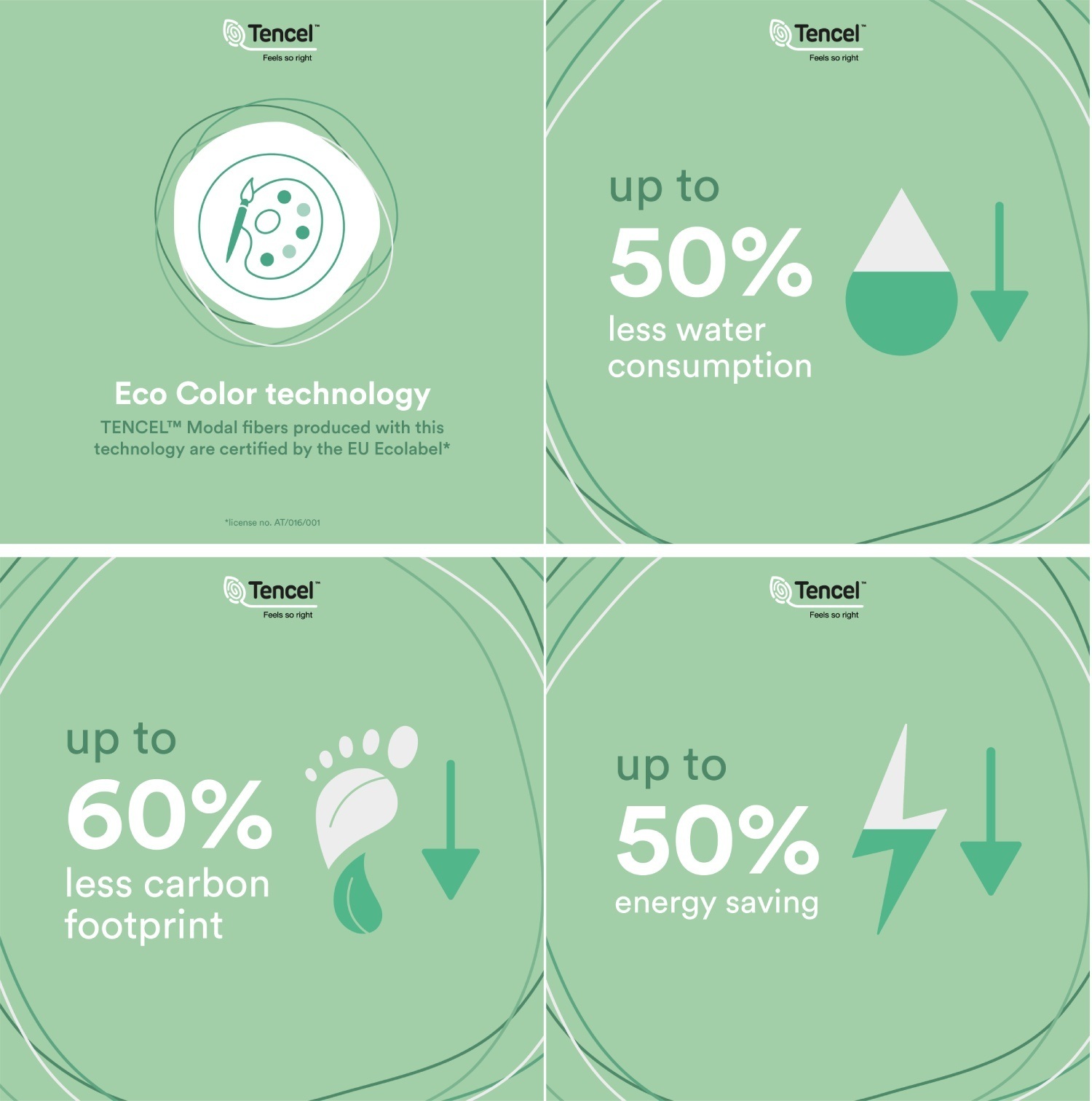please select your preferred language
please select your preferred language
As an industry pioneer, Lenzing has worked with different mill partners to make a positive sustainable impact on the fashion and textile industries. Recently, Lenzing has developed the “Black Label” capsule collection with a number of mill partners featuring TENCEL™ branded modal fibers with Eco Color technology to highlight the benefits of Lenzing’s spun-dyed fibers and thus addressing the increasing eco consciousness of consumers.

Common across all partners are trends toward closed-loop production processes. Sustainability is now a core element of their business and the durable and versatile TENCEL™ Modal fibers are a natural addition to their sustainable textile product lineups.
We asked our mill partners what sustainability means to them, and their experience working with the TENCEL™ brand’s high quality and sustainable modal fibers offering. Read on for their perspectives.
Q: What is the importance of sustainability in textiles/ footwear production? Where do you see the industry moving?
Çiğdem Kaçar, Calik Denim: Sustainability is not a trend, it is a must for textiles production because there are many aspects of the textile industry that can evolve to contribute to the protection of our planet as well as to offer better working conditions for employees. In addition, both our customers and end-users also care deeply about sustainability much more compared to previous years. So, as a textiles companies we all have to think about the future and act in a sustainable way.
Pilar Tejada López, Pyrates: As textile producers, we believe it is our responsibility to contribute to the industry's journey toward eco-friendly products and production methods. Consumers' demand for sustainable and traceable products has increased greatly in the last few years. This is a trend we expect to remain. Our hope is that this newfound demand will force the industry to catch up and reach a point where production is as eco-friendly as it can be.
Shadow Chan, Tat Fung Textile: We believe that all future activities will need to benefit society, textile industries need to minimize their impact on the environment as low as they could. Therefore, we are investing in ethical strategies and actions in every stage of our business more than ever. We have embraced sustainability as a platform for innovation.

© Stiefkind Fotografie
Q: How does your company approach sustainability trends or the subject of sustainability in general?
Aaron Sung, Esquel Group: At Esquel, sustainability is core to our business strategy to affect decisions and behaviors. It is also the responsibility of every employee. By embracing our four strategic pillars: People, Planet, Product, and Community, we are constantly measuring our impact on the environment, the society, and the communities in which we operate. Many of our customers seek for sustainable yarns. By blending TENCEL™ Modal fibers and our signature cotton, these blended yarns take us a step further in environmental excellence in the textile industry. To this end, we innovate using technologies and information systems, and invest in people to advance balanced social, economic, and environmental development.
Hürriyet Öztürk, Kipas Denim: Sustainable production is in our DNA, and we are committed to make a positive impact in the fashion and textile industry. Kipas’ spinning mill is committed to improving cotton farming practices globally. We are producing 60% of our products with sustainable resources, recycling 100% of production waste, and embracing waste as a revenue. Our goal is to use 100% sustainable resources in 2025.
Pilar Tejada López, Pyrates: We try to be as eco-friendly as possible and are always looking for new ways to improve, not only through our production process, but also in our products and the way we work. We try to use sustainable fibers in our formulas: natural, organic, biodegradable or upcycled fibers, which consumes less water, energy and CO2 during their production process. We focus on developing fully traceable, durable fabrics, which, due to their quality, will last in one’s wardrobe for years.

© Stiefkind Fotografie
Q: What is your experience with TENCEL™ Modal fibers produced with Eco Color technology? What contribution do these fibers make to the environment?
Hatice Ates, Ekoten Fabrics: We developed different modal fabrics with TENCEL™ Modal fibers produced with Eco Color technology. The fabrics we produced are spun-dyed, which results in less chemicals used and less energy consumed. The hand-feel of the TENCEL™ Modal fiber is softer, smoother and shinier compared to normal modal fabrics.
Hürriyet Öztürk, Kipas Denim: For us, since TENCEL™ Modal fibers and recycled polyester fibers are already black in color, we do not need an additional coloring process and therefore, we don’t produce extra water and energy waste. Furthermore, we found that even after multiple washes, the fabric produced with TENCEL™ Modal fibers remained soft with no discoloration. All features combined make these fibers very environmentally friendly, which complements our sustainable fiber collection as well.
Marven Chick, Aussco Hong Kong Limited: We are particularly impressed with the excellent hand-feel, fineness and feather lightness of the material. TENCEL™ Modal fibers use an eco-responsible technology to save energy, water, as well as carbon footprint. This results in a smaller environmental impact, which is a very crucial part of sustainability in the fashion industry.
With its long-lasting color fastness and environmental excellence, TENCEL™ Modal fibers produced with Eco Color technology is an exquisite contribution to the environment and gives Aussco the assurance to produce with TENCEL™ Modal fibers.

© Stiefkind Fotografie

© Stiefkind Fotografie